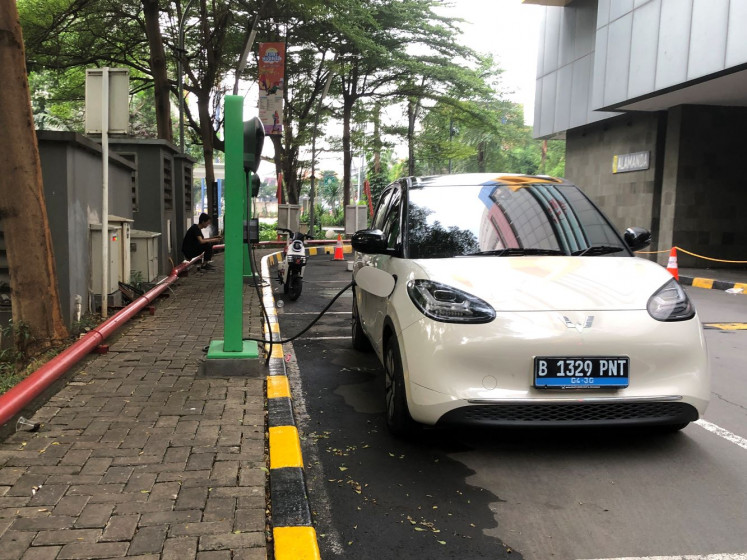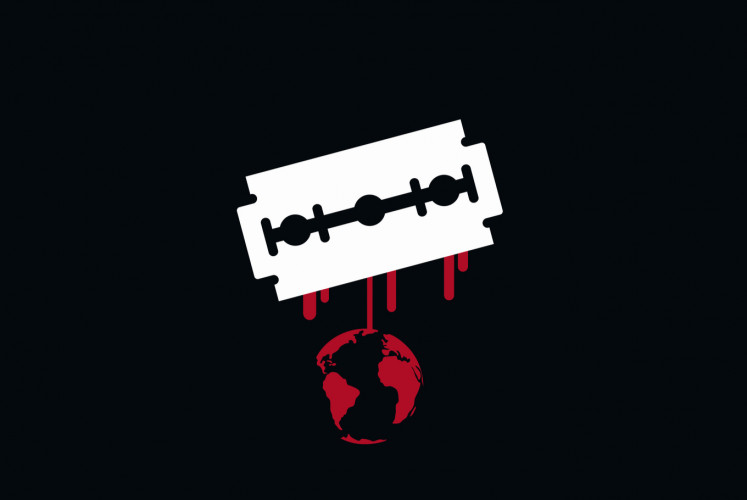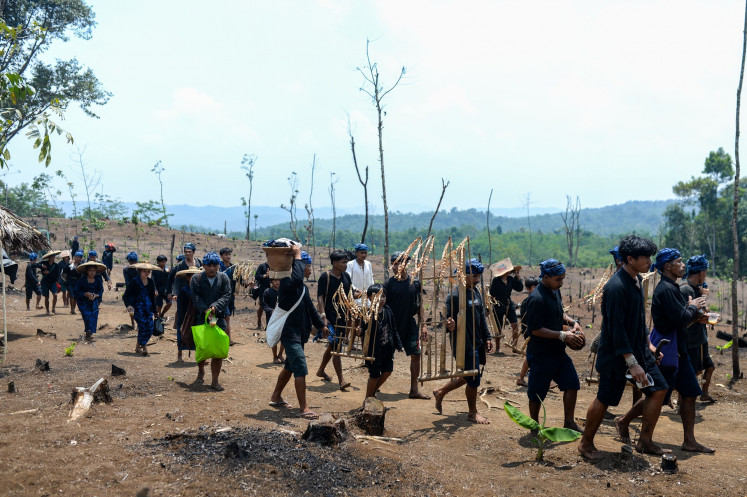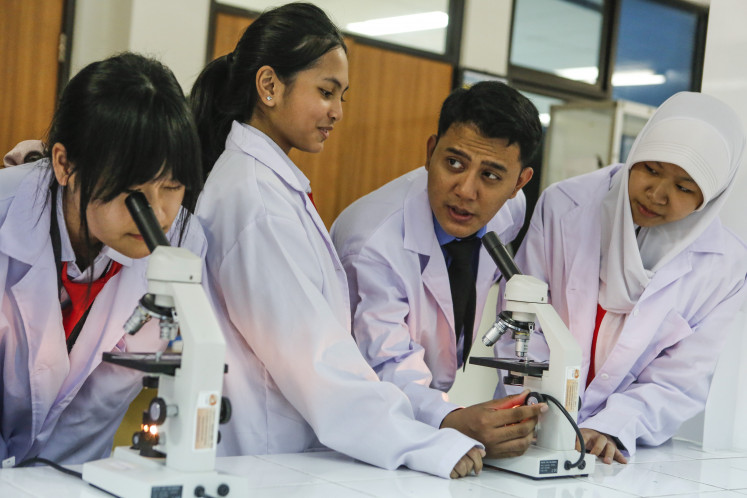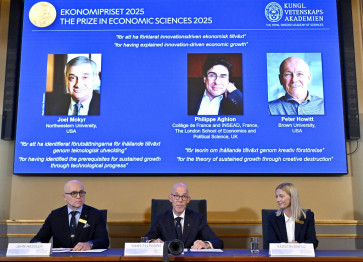Popular Reads
Top Results
Can't find what you're looking for?
View all search resultsPopular Reads
Top Results
Can't find what you're looking for?
View all search resultsWhat the Nobel Prize says about Indonesia’s future growth
Prosperity depends less on how much capital you pour in, and more on whether societies can generate and spread “useful knowledge.”
Change text size
Gift Premium Articles
to Anyone
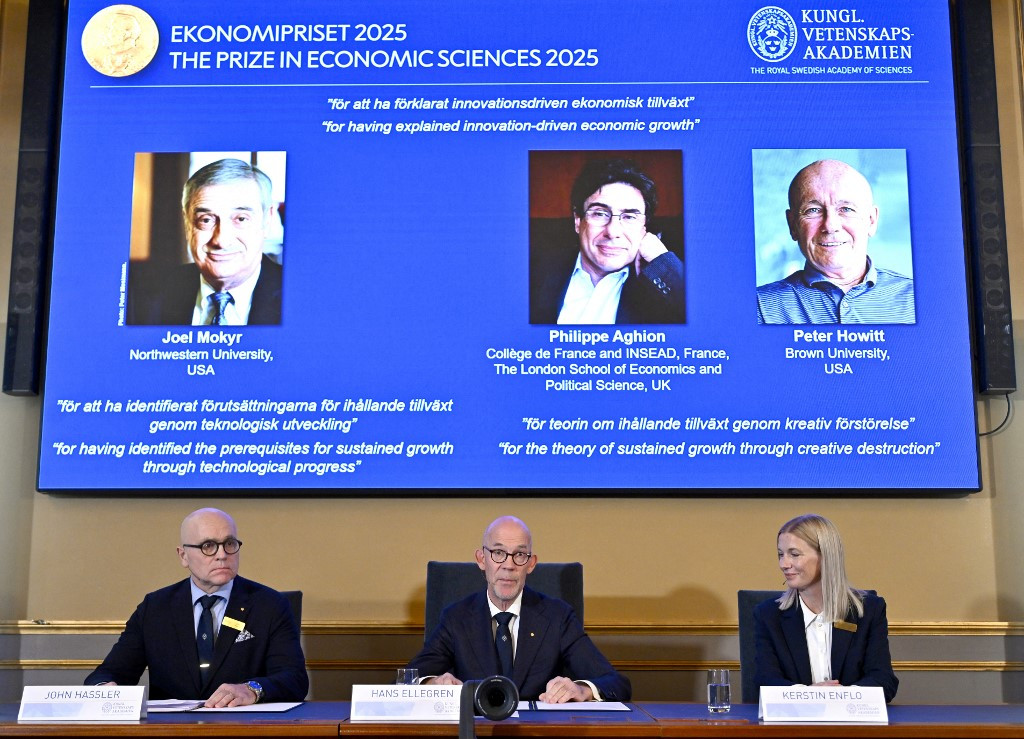 John Hassler, Chair of the Committee for the Prize in Economic Science in Memory of Alfred Nobel, the Secretary General of the Royal Swedish Academy of Sciences Hans Ellegren and Kerstin Enflo, member of the Committee for the Prize in Economic Sciences in Memory of Alfred Nobel (left to right) sit in front of a screen displaying the portraits of the 2025 prize winners (left to right) Joel Mokyr, Philippe Aghion and Peter Howitt, as they addresses journalists on Oct. 13 during the announcement of the winner of the 2025 Nobel Prize in Economics, the Sveriges Riksbank Prize in Economic Sciences in Memory of Alfred Nobel, at the Royal Swedish Academy of Sciences in Stockholm. (AFP/Anders Wiklund)
John Hassler, Chair of the Committee for the Prize in Economic Science in Memory of Alfred Nobel, the Secretary General of the Royal Swedish Academy of Sciences Hans Ellegren and Kerstin Enflo, member of the Committee for the Prize in Economic Sciences in Memory of Alfred Nobel (left to right) sit in front of a screen displaying the portraits of the 2025 prize winners (left to right) Joel Mokyr, Philippe Aghion and Peter Howitt, as they addresses journalists on Oct. 13 during the announcement of the winner of the 2025 Nobel Prize in Economics, the Sveriges Riksbank Prize in Economic Sciences in Memory of Alfred Nobel, at the Royal Swedish Academy of Sciences in Stockholm. (AFP/Anders Wiklund)
T
his week, the Nobel Prize in Economics went to three scholars Joel Mokyr, Philippe Aghion and Peter Howitt for explaining how innovation drives long-run growth. On the surface, this might sound abstract, a matter for theorists and historians.
Yet the core lesson is simple: prosperity depends less on how much capital you pour in, and more on whether societies can generate and spread “useful knowledge.”
For Indonesia, standing at a crossroads between middle-income comfort and high-income aspiration, its message could not be more urgent.
Mokyr, an economic historian, taught us that the Industrial Revolution was not inevitable. It happened because Europe developed institutions and a culture that made knowledge production and diffusion cheap, open and rewarded. Scientists, engineers and entrepreneurs interacted in a way that generated cascades of small and large inventions. Importantly, dissent was protected, incumbents could be challenged and ideas traveled freely across borders. Growth was sustained not by rice harvests or coal production, but by the constant recombination of ideas.
Aghion and Howitt, meanwhile, put mathematical flesh on Joseph Schumpeter’s bones. They modeled growth as a process of “creative destruction”: firms climb quality ladders by innovating, and each step displaces yesterday’s leaders. Their framework shows why competition matters, too little and incumbents get lazy, too much and rents disappear, killing incentives to invest in R&D.
The trick is finding the sweet spot, especially for countries at different stages of development. Policies that work when you are far behind (protection, imitation, state-led industrialization) become counterproductive as you approach the frontier. At that point, economies need openness, contestability, bankruptcy laws that allow exit and financial systems that can fund risky experimentation.
The World Development Report (WDR) 2024 reinforces this message: development is not a single transition, but two.






